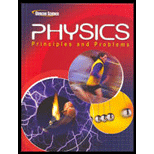
a.
The equivalent resistance of the parallel circuit.
a.
Answer to Problem 16PP
Explanation of Solution
Given:
The potential applied,
The first resistor,
The second resistor,
The third resistor,
Formula used:
In parallel combination of resistors, the net resistance is,
Calculation:
Using above formula, the net resistance will be,
Conclusion:
Hence, the net resistance of the parallel combination is
b.
The net current through the parallel circuit.
b.
Answer to Problem 16PP
Explanation of Solution
Given:
The potential applied,
The first resistor,
The second resistor,
The third resistor,
From part (a), the net resistance,
Formula used:
Ohm’s law,
Where,V is the voltage, I is the current and R is the resistance.
Calculation:
Using above formula, the net current through the circuit will be,
Conclusion:
Hence, the net current through the parallel combination is
c.
The current through each resistor.
c.
Answer to Problem 16PP
Explanation of Solution
Given:
The potential applied,
The first resistor,
The second resistor,
The third resistor,
From part (a), the net resistance,
Formula used:
Ohm’s law,
Where,V is the voltage, I is the current and R is the resistance.
Calculation:
It is known that in parallel, potential remains same. Thus, the current through the first resistor is,
Similarly, the current through the second resistor is,
And, the current through the third resistor is,
Conclusion:
Hence, it can be observed that the net current through the circuit is equal to the sum of the current through each resistor.
Chapter 23 Solutions
Glencoe Physics: Principles and Problems, Student Edition
Additional Science Textbook Solutions
Physics for Scientists and Engineers: A Strategic Approach, Vol. 1 (Chs 1-21) (4th Edition)
Microbiology: An Introduction
Organic Chemistry (8th Edition)
Anatomy & Physiology (6th Edition)
Genetic Analysis: An Integrated Approach (3rd Edition)
Introductory Chemistry (6th Edition)
- Figure 29-43 Problem 12. ••13 In Fig. 29-44, point P₁ is at distance R = 13.1 cm on the perpendicular bisector of a straight wire of length L = 18.0 cm carrying current i = 58.2 mA. (Note that the wire is not long.) What is the magnitude of the magnetic field at P₁ due to i? P2° R R Larrow_forwardCheckpoint 1 The figure shows the current i in a single-loop circuit with a battery B and a resistance R (and wires of neg- ligible resistance). (a) Should the emf arrow at B be drawn pointing leftward or rightward? At points a, B C R b, and c, rank (b) the magnitude of the current, (c) the electric potential, and (d) the electric potential energy of the charge carriers, greatest first.arrow_forwardPls help ASAParrow_forward
- Pls help asaparrow_forwardPls help asaparrow_forward3. If the force of gravity stopped acting on the planets in our solar system, what would happen? a) They would spiral slowly towards the sun. b) They would continue in straight lines tangent to their orbits. c) They would continue to orbit the sun. d) They would fly straight away from the sun. e) They would spiral slowly away from the sun. 4. 1 The free-body diagram of a wagon being pulled along a horizontal surface is best represented by A F N B C 0 Ꭰ FN E a) A b) B c) C app app The app 10 app d) e) ס ח D E 10 apparrow_forward
 College PhysicsPhysicsISBN:9781305952300Author:Raymond A. Serway, Chris VuillePublisher:Cengage Learning
College PhysicsPhysicsISBN:9781305952300Author:Raymond A. Serway, Chris VuillePublisher:Cengage Learning University Physics (14th Edition)PhysicsISBN:9780133969290Author:Hugh D. Young, Roger A. FreedmanPublisher:PEARSON
University Physics (14th Edition)PhysicsISBN:9780133969290Author:Hugh D. Young, Roger A. FreedmanPublisher:PEARSON Introduction To Quantum MechanicsPhysicsISBN:9781107189638Author:Griffiths, David J., Schroeter, Darrell F.Publisher:Cambridge University Press
Introduction To Quantum MechanicsPhysicsISBN:9781107189638Author:Griffiths, David J., Schroeter, Darrell F.Publisher:Cambridge University Press Physics for Scientists and EngineersPhysicsISBN:9781337553278Author:Raymond A. Serway, John W. JewettPublisher:Cengage Learning
Physics for Scientists and EngineersPhysicsISBN:9781337553278Author:Raymond A. Serway, John W. JewettPublisher:Cengage Learning Lecture- Tutorials for Introductory AstronomyPhysicsISBN:9780321820464Author:Edward E. Prather, Tim P. Slater, Jeff P. Adams, Gina BrissendenPublisher:Addison-Wesley
Lecture- Tutorials for Introductory AstronomyPhysicsISBN:9780321820464Author:Edward E. Prather, Tim P. Slater, Jeff P. Adams, Gina BrissendenPublisher:Addison-Wesley College Physics: A Strategic Approach (4th Editio...PhysicsISBN:9780134609034Author:Randall D. Knight (Professor Emeritus), Brian Jones, Stuart FieldPublisher:PEARSON
College Physics: A Strategic Approach (4th Editio...PhysicsISBN:9780134609034Author:Randall D. Knight (Professor Emeritus), Brian Jones, Stuart FieldPublisher:PEARSON





